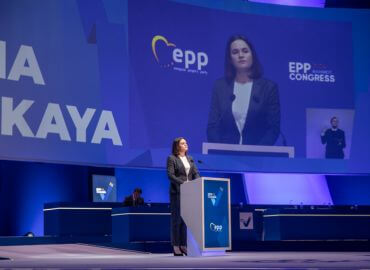- PROVOCATIONS BY LUKASHENKA TROOPS TURN BORDER CRISIS INTO ANOTHER «RYANAIR CASE»
- IRAQ SHUT DOWN TWO BELARUS CONSULATES
- LUKASHENKA STILL TRIES TO «SELL» THE IMITATION OF A CONSTITUTIONAL REFORM
- PUTIN SIGNS INTEGRATION ROADMAPS WITH SELF-DECLARED "PRESIDENT"
PROVOCATIONS BY LUKASHENKA TROOPS TURN BORDER CRISIS INTO ANOTHER «RYANAIR CASE»
This is an update on the ongoing political crisis in the Republic of Belarus prepared for you by the International Strategic Action Network for Security (iSANS).
The latest escalation of crisis on the border between Belarus and the EU is unprecedented for the region since Soviet provocations against Lithuania in early 1990s. On Monday, November 8, thousands of migrants were massing in Belarusian territory along the borderline with Poland in organized groups led by uniformed Belarus officials. The migrants arrived in organized groups and attacked border infrastructure of the Republic of Poland (both NATO and EU member). Belarus officials in border guards uniforms did not interfere to stop provocations – although the migrants clearly violated the border of both Poland and Belarus in numerous cases.
No migrants are known to be arrested or otherwise affected by Lukashenka-controlled border guards on the grounds of aggressive actions against officials and facilities located in neighboring Polish territory. After numerous provocations, the migrations set up a camp near Polish border fence that is already recalling the images of Greek-Macedonian border at the height of the 2015-16 migrant crisis.
President of the European Comission Ursula von der Leyen called on the EU to approve extended sanctions against «Belarusian authorities responsible for this hybrid attack» while Kremlin spokesman Dmitry Peskov endorsed Lukashenka’s borderline activity.
Polish authorities expect major provocations by Lukashenka-controlled security on Tuesday as nearly 12,000 Polish soldiers are now stationed in crisis-affected area. a spokesman for Poland’s security forces, Stanislaw Zaryn, said in a statement that «large groups of migrants … are fully controlled by the Belarusian security services and army.» Lukashenka’s goal is to escalate the crisis as a form of retaliation against Western sanctions, but it is clear the West can not accept Lukashenka’s coercion to cooperate with him as it will become a precedented for other authoritarian states.
In responser to the crisis, Donald Tusk (the leader of Poland’s main opposition party) said on Monday that Poland should consider invoking Article 4 of the NATO Treaty to deal with the crisis. In non-related publication by AFP, an unnamed NATO official referred to weaponization of migrants by Lukashenka regime as «hybrid tactics», and said the alliance was worried about «escalation» on the border with Poland. Term «hybrid tactics» goes in line with paragraph 31 of the final document of June 2021 NATO Summit that discusses invoking Article 5 of NATO Treaty in case of «hybrid war» against one or a few member states. As of Tuesday morning, there has been no known indications of Poland initiating the application of Article 4 or Article 5 of NATO Treaty.
Last Wednesday, Poland’s Foreign Ministry had summoned Belarusian charge d’affaires after a group of armed Belarusian soldiers crossed into the territory of Poland. Stanislaw Zaryn reported that after crossing approximately 300 meters, the Belarusian personnel were confronted by a Polish patrol. The Belarusians «reloaded their weapons and then departed». Zaryn added that there has been a «series of incidents and provocations organized by Belarusians, but this was the most dangerous incident so far.»
On Thursday last week, Polish Defense Ministry stated that a Belarusian soldier tried to fire flares at Polish border troops as five armed Belarusians tried to destroy the border fence nearly 100 meters away from the place of the incident. Reportedly, they threatened to shoot Polish soldiers. Same day, Polish defense minister Mariusz Blaszczak posted on his Twitter a picture of Belarusian soldiers equipped with wire cutters. He added that «Belarusians are trying to escalate the situation every day by provoking and pushing migrants across the border.» Yesterday, there’s reportedly been more shots fired by the Belarusian side. Belarus «Foreign Ministry» denied all allegations of any provocations or border incidents.
Earlier past week, Polish president Andrzej Duda signed a special law on constructing a permanent fence on the border with Belarus. The fence will be over 5 meters high and almost 200 kilometres long, and will cost over 300 million euro. The construction is expected to start by the end of the year. Meanwhile, Lithuania has already started replacing the stretches of barbed wire put up in the summer with a 3.4-metre-high steel wall. The 500-kilometer-long stretch is expected to be completed by September next year.
IRAQ SHUT DOWN TWO BELARUS CONSULATES
Kurdish news outlets reported on Saturday last week that the Iraqi MFA ordered the closure of Belarusian consulates in Baghdad and Erbil after thousands of Iraqis were lured to Belarus to be dumped on the border with the EU. Iraqi Kurds constitute the majority of migrants who use «Belarusian» route to get to the EU. The decision came a few days after Kurdish most influential Barzani family – who before the last week hadn’t shown any interest in resolving the migrant crisis – unexpectedly summoned Belarus’ ambassador to discuss “necessary measures to prevent irregular migration.
However, it seems the decision to shut down its consulates in Iraq didn’t come as a surprise for the Belarusian authorities. Last week, ambassadors of Syria and Palestine were invited to the Belarusian MFA to discuss, among other things, «confronting Western coercive measures». It is likely that Belarus is planning to replace Iraqis with Syrians and Palestinians. Belarus’ authorities have also announced that regular international flights will start arriving to regional cities, not just Minsk.
LUKASHENKA STILL TRIES TO «SELL» THE IMITATION OF A CONSTITUTIONAL REFORM
Last Thursday, Lukashenka held a meeting with the so-called «Constitutional Commission» where he confirmed that the constitutional referendum will take place next February – less than four months away from now. During the meeting, the head of the presidential administration (former KGB official) Ihar Serheenka, stressed that the commission puts the greatest emphasis on strengthening the powers of the (now unconstitutional) All-Belarusian People’s Assembly (ABPA) which is likely to be «sold» to the West and Russia as a formal safeguard to control the future president, who, in turn, would be formally stripped of his superpowers. A two term limit lifted in 2004 is expected to be reintroduced. It is also proposed to deprive the president of his rights to issue decrees (in Belarus, this controversial instrument has the force of law and has become one of the main sources of legislation with the rise of Lukashenka regime) and to repeal Government acts.
Contrary to the president, the All-Belarusian People’s Assembly would formally «become» much stronger. The so-called «Constitutional Commission» wants to give the ABPA the formal right of impeachment. It would also be able to amend the Constitution, appoint the Central Election Commission and the Constitutional Court. Earlier Lukashenka hinted that he considers taking up the role of the chairman of the ABPA: «Remember and tell the others – if you want Lukashenka to become chairman of the All-Belarusian People’s Assembly, you should ask me on your knees and thank me if I agree.»
The general agreement among Belarusian political scientists is that the idea of constitutional referendum is being pushed by Moscow. After August 2020, the Kremlin openly supported the idea of «constitutional reform» in Belarus as a means of overcoming the political crisis. However, it is clear that Lukashenka does not plan to change his way of doing things and managing the country through a personalistic dictatorship.
PUTIN SIGNS INTEGRATION ROADMAPS WITH SELF-DECLARED "PRESIDENT"
At a virtual meeting of the Supreme State Council of the Union State, held as a video conference last Thursday, Putin and Lukashenka signed off on 28 road maps aimed at deepening the integration. The document focuses mainly on economic and regulatory issues, such as common policies on taxation, banking, industry, agriculture, and energy. On top of that a new joint military doctrine has been signed.
The signing is unlikely to bring a breakthrough in the integration of the two countries. The document mainly features words such as «convergence», «harmonisation», «integration» – and only in one case «unification» (in relation to the logistics market). Effectively, these 28 roadmaps are merely declarations that exclude political integration. Compared to the Kremlin’s 2019 proposals, the final document is completely hollowed out.
More interesting than the document itself were the circumstances of the signing. Putin participated by video link from Russia-annexed Crimea (annexation remains not recognized internationally). Lukashenka (internationally not recognized as a president of Belarus) decided to take this opportunity to congratulate Crimeans on Russia’s National Unity Day and complained that Putin was not inviting him to visit Crimea. Commenting on Lukashenka’s words, Belarusian MP Andrey Savinykh, who lately became increasingly vocal, said the following: «Both de facto, and de jure, Belarus has long ago recognized Crimea as Russian. The only thing that was missing was some kind of political statement to formalise this.» Surprisingly, Ukraine remained silent on this public statement.
Best regards,
iSANS team










